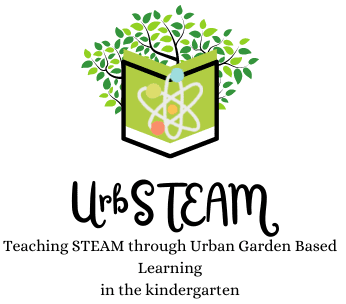Erasmus
UrbSTEAM
Finish: - 20/02/2024.
Sub-Programme: Teaching STEAM through Urban Garden Based Learning in the kindergarten

The European Commission support for the production of this publication does not constitute an endorsement of the contents which reflects the views only of the authors, and the Commission cannot be held responsible for any use which may be made of the information contained therein.
Description
In early childhood, the comfort with math (& STEM in general) and fluency with the subject can be the strongest predictors of later academic success than even literacy. There are studies that show that children who enter kindergarten with a certain comfort with math go on to be high achievers through their middle and high school years (Claessens and Engel 2013). Researchers have observed children at play and noted that mathematical thinking shows up frequently in play settings (Ginsburg 2000). For example, children’s play involves pattern and shapes, comparisons, and numbers.
This tells us that young children have an innate curiosity about math and a natural tendency to “think math.” Research suggests that active exploration wires the brain, and helps kids develop powerful intuitions about concepts central to science, technology, engineering, and mathematics (Dewar,2016). An innovative approach is to use the natural world as an innately fascinating context within which to learn mathematical concepts. Moreover, teaching math this way is also an opportunity to simultaneously build students’ interest in Nature. In the same time, there has been a growth in garden-based learning (GBL) practices at school grounds and in garden-based programs in North America. Gardens and garden-based programs are legitimate academic venues where children learn and thrive (Blair, 2009; Desmond, 2003;Thorp, 2006; Williams & Brown, 2012).
Additionally, nature experiences during childhood can have an important influence on adult environmental attitudes and behaviours toward the more-than-human world as it t has been argued before by diverse authors (Lohr & Pearson-Mims, 2005; Wells & Lekies, 2006).
The aim of the project is to teach STEAM by using hands on activities on urban gardens and integrating permaculture values. STEAM is an integrated approach to learning which requires two or more standards from Science, Technology, Engineering, Math, and the Arts to be taught AND assessed in and through each other. Participants (educators and children) will become familiar with the space of a garden as a rich environment for teaching and learning across the curriculum, especially on STEAM field. Ecological and social justice considerations will frame all aspects of the project, with a particular focus on the place of the teacher (personal, cultural, and geographic positioning and identities) in garden-based education. Extensive engagement with gardening practices, food preparation activities (including eating!), and critical dialogue will be the pedagogical modes of exploration throughout the project. This project bridges the gap by detailing how best to integrate Urban Gardening into teaching and learning, specifically in preschool. We are trying to strengthen to the means of implementing STEAM, by using garden as co-teacher in preschool.
Objectives
The main objective of the project is enhancing the knowledge of 150 kindergarten educators on teaching of STEAM through urban gardening. Gardens as educational places ask educators and learners to value process over product and attend to the moment as it unfolds. School gardens encourage students and educators to look for connections between subjects and ecosystems; to embrace spontaneity and sensuality as well as critical thinking and experimentation. Another objective of this project is the integration of Permaculture values.
The UrbSTEAM initiative will meet the needs and requirements of both teachers and the children whom they are teaching.
Our consortium is going to work together to explore the current situation in each country related to the outdoor learning, urban gardening, and STEAM.
The UrbSTEAM project will revolve around the production of 3 innovative results:
R1. Manual of best practices on garden-based learning and development of educational material
R2. Toolkit for educators andschools
R3.Online learning platform and networking


